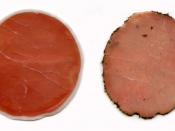The issue of health and longevity has been a major discussion in today's health conscious society. Thus, in recent years, many people have came up with several components that does play a role in health and longevity. With the idea of a healthy diet as the base, there are still numerous non-dietary factors that are crucial in health and longevity. Hence, this essay will first touch on dietary factor as a primary element in health and longevity. Then, it will discuss non-dietary factors, namely, lifestyle, attitude and culture which contributes to the quality and length of life.
To begin with, since the beginning of human evolution, diet has always been a fundamental aspect of life. A balanced diet, that is the right consumption of food, is vital for health and longevity. A study on Aborigines' diet shows that when political changes were imposed on Aborigines, which is by providing them diet that consists of 'little more than flour, tea and sugar, [as well as] saturated animal fat', they were unable to supplement such a diet and suffered from late onset diabetes.
However, when they were given their traditional diet which consists of low-fat meat and lots of vegetable, there was a great decline of the Aboriginal communities suffered late-onset diabetes (Casey 1993:10). This provides evidence that a near-vegetarian diet with high fibre, low salt, and few processed foods 'promotes health and greater longevity' (British Medical Association 2002:208). Thus, eating a healthy diet in ones everyday life is necessary to for a healthy and longer life.
However, although diet is essential in promoting health and longevity, non-dietary factors is equally significant. To begin with, the lifestyle of an individual is one of the many non-dietary factors that affect ones health and longevity. An Okinawa study conducted by Craig and Bradley...


